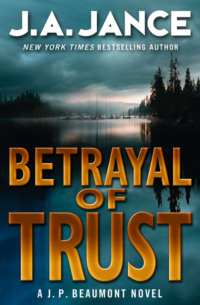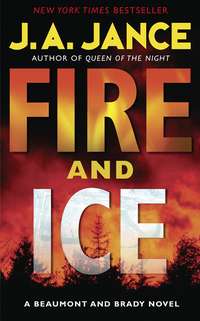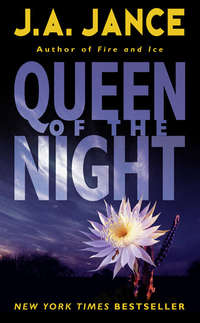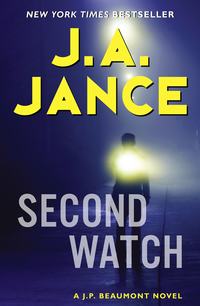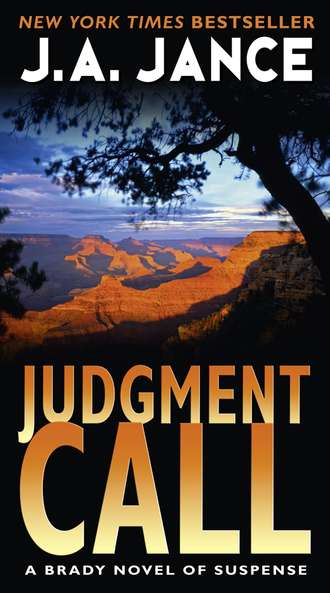
Полная версия
Judgment Call
Once the roadway was cleared, however, the wash still wasn’t passable. Not wanting to risk having another vehicle stuck in the torn-up sand, Joanna had Dave Hollicker lay down two tracks of interlocking plastic pavers that created a solid enough surface across the churned sand that even the M.E.’s front-wheel-drive minivan could cross the wash with no difficulty. In the meantime, Terry Gregovich and his German shepherd, Spike, had been searching the surrounding area in ever-widening circles.
“Hey, boss,” Terry called. “Come look. I think we found something. I’ve got a set of footprints heading that way.”
Unfortunately, the direction in which he was pointing was also the same direction they had all come from—down High Lonesome Road and directly past the ranch.
Clearly reading the concerned expression on Joanna’s face, Deb offered welcome reassurance. “I’ve already got uniformed deputies on their way to check out all the outbuildings at your place and at Carol Sunderson’s.”
“Thank you.”
Joanna stared down at the faint remains of a shoe print left in a patch of dust along the shoulder of the road. “Good spotting,” she told Terry. “When Dave is done with the pavers, I’ll have him come check it out. This one doesn’t look well-enough defined for a plaster cast to work, but he can at least take some measurements.”
“You want us to try following the trail?” Terry asked.
“Please,” Joanna said. “If you come across any better prints, let Dave know so he can try to get plaster casts.”
As Joanna turned back north toward the wash and the collection of vehicles, she spotted a vulture drifting in ever narrowing circles on the air currents far above them. There was little question about the carrion eater’s target.
“We’d better get a move on,” she said. “Otherwise the buzzards will be back there before we are.”
“Dr. Machett would not be pleased,” Deb said.
“No,” Joanna agreed. “It would give him one more thing to complain about.”
And blame on me. She thought that last sentence, but she didn’t say it aloud.
Detective Jaime Carbajal arrived on the scene. He drove up to the vehicles collected at the wash, then pulled a U-turn and came back.
“Dave has the pavers in place,” he said. “Time to head out.”
The second wash, with a bed of mostly undisturbed sand, was far easier to cross than the one that had been blocked by the stalled car and torn up by the towing process. Minutes after crossing the first one the caravan of official vehicles, led by Dave Hollicker’s aging Tahoe and with Dr. Machett’s far newer minivan second in line, arrived at the actual crime scene. Everyone else waited while Dave and the still-disgruntled M.E. walked toward the body. Joanna might have followed them, but her phone rang just then.
“Two of your deputies just gave our place a clean bill of health,” Butch said. “They’re headed for Carol’s place next. You’re not overreacting, are you? Do you really think a guy who had killed someone would be dumb enough to stop off at the sheriff’s place on his way out of Dodge?”
“Nobody ever said crooks are smart,” Joanna said. “The K-9 unit is trying to follow the trail. It seems to lead straight south on High Lonesome.”
“Okay, then,” Butch replied. “I’ll tell Jenny that the next time she decides to go out for an early-morning ride, she needs to wake me so I can walk down to the barn with her.”
The idea that their kids might need that kind of protection in order to be safe in their own backyard was beyond disturbing.
“Sad but true,” Joanna agreed. “I need to go. I’ll stop back by the house when we finish up here.”
Joanna and her people stayed out of the way while Dr. Machett completed his preliminary examination of the body and while the M.E. and his recently hired assistant loaded the bagged remains. As Dr. Machett’s minivan drove off in a cloud of dust, Joanna caught sight of an arriving vehicle, which pulled aside to let them pass. Due to the remote location of the crime scene, Joanna hadn’t posted a deputy to secure it. When the white RAV4 stopped beside her, Joanna realized that had been a serious oversight on her part.
The new arrival turned out to be one of Sheriff Brady’s least favorite people, none other than Marliss Shackleford. A woman of indeterminate years, Marliss was a longtime employee of the local paper, the Bisbee Bee. Her signature column, “Bisbee Buzzings,” was more of a gossip column than anything else, one that served up the paper’s bread and butter, a plethora of local names. In recent years, however, the economic reality of running a small paper had caught up with the Bee. Marliss still wrote her column, but she was also the paper’s sole reporter, covering everything but sports, which were handled on a part-time basis by a retired BHS football coach.
Joanna was not happy about any reporters showing up at a still-active crime scene. That went double for Marliss, who maintained a close personal friendship with Joanna’s mother and who was married to Richard Voland, a local private eye who had once been Joanna’s chief deputy. Neither of those relationships did a thing to endear Marliss to Joanna.
As the reporter’s vehicle slowed, Joanna stepped forward to cut her off, motioning for her to roll down the window.
“This is a crime scene,” she said brusquely. “You need to move along.”
Instead, the reporter shifted her Toyota into park, switched off the ignition, and stepped out of the car with her iPad in hand. Marliss was dressed in a brightly chartreuse pantsuit. Her brassy mane of recently frosted curls glowed in the sunlight. The combination of the green pantsuit and the aggressively blond hair put Joanna in mind of an ear of corn. She allowed herself a mental smile but didn’t indulge in a physical one.
“Is it true you’ve found Debra Highsmith’s body?” Marliss demanded.
What Joanna needed right then was to have her chief deputy on hand to run media relations interference. Unfortunately it was after nine on a Friday. That meant Tom Hadlock was already on his way to monitor that week’s regular meeting of the county board of supervisors.
Marliss’s arrival at the crime scene and her premature knowledge of the victim’s name meant that she had somehow obtained access to unauthorized information about both the crime scene and the victim’s identity. That left Joanna to draw the disconcerting conclusion that either she had a leak inside her own department or Guy Machett had one in his. While hoping for the latter, Joanna made an effort to maintain her game face.
“Come on, Marliss,” she said. “You know the drill. No comment at this time. We don’t release any information about the victim until we’ve made a positive ID and until we’ve notified the next of kin. Once we do that, we’ll be sure to let you know.”
Marliss wasn’t dissuaded.
“Right,” she muttered. “Along with everyone else. This is a big story, Joanna.” In a piece of gamesmanship of her own, the reporter deliberately avoided the use of Joanna’s official title. “A big local story. You can’t expect me to sit on a scoop like this indefinitely.”
Marliss had been divorced for a long time when she scored big by marrying a man a decade and a half younger than she was. Since then she had invested in any number of “image-enhancing” procedures. In the harsh sunlight, when her lips shifted into a pout, glimpses of her history of cosmetic changes showed through her carefully applied makeup, making it clear that she was far older than a first impression might have indicated.
“It’s exactly what I expect,” Joanna replied firmly. “We’ll have a press briefing maybe later on today. In the meantime, I’d like to know where you’re getting your information.”
“Have you ever heard of freedom of the press?” Marliss shot back. “I’m a reporter, and I’m under no obligation to reveal my confidential sources.”
“True,” Joanna said, “but you also don’t get preferential treatment.”
“I don’t have to not publish something I know just on your say-so.”
“What you think you know,” Joanna corrected. “And you’re right. You’re welcome to publish whatever you want. Putting something about a victim in your paper prior to our notifying the family would be reprehensible, but it wouldn’t be against the law. You should leave now.”
Marliss’s cheeks glowed with fury and her Botoxed lips pulled into a sneer, but she kept her tone civil. “Very well,” she said. “I’m leaving.” She reached out to open the door on the RAV4. Then she stopped and turned back to Joanna. “By the way,” she said, “how’s Jenny doing these days?”
It was an out-of-the-blue question. As far as Joanna knew, Jenny’s only meetings with Marliss had occurred mostly during coffee hours after Sunday services at Tombstone Canyon United Methodist Church, although she supposed Jenny could have encountered Marliss when she was out with Joanna’s mother.
“Jenny’s fine,” Joanna answered.
“Good,” Marliss replied with a smile that was as unsettling as it was insincere. “Glad to hear it.”
Once in the SUV, she slammed it into gear, made a quick U-turn, and then took off, leaving Joanna standing there in a cloud of gravel and dust. She looked down at the grimy uniform she had put on clean only a couple of hours earlier. She’d have to shower and change before she showed up at the office.

JOANNA SENT Deb Howell off to start tracking down the victim’s next of kin while Jaime, Dave, and several uniformed officers stayed at the crime scene conducting a systematic search of the area. Unfortunately, they came up empty-handed. The killer had evidently picked up all his brass. In spots where there might have been footprints, there was evidence that the ground had been swept clean. Dave was able to make casts of one set of tire tracks, but it seemed likely that they would match the tires on Debra Highsmith’s vehicle, which had now been hauled off to the department’s impound lot.
The only conclusion to be drawn from this was that the perpetrator was someone who was careful enough to cover his tracks—literally.
By the time Joanna finally got back home to High Lonesome Ranch to shower and change, she was famished and hoping for breakfast, but Butch had Dennis in his car seat, and the two of them were just pulling out of the garage.
“I’m on my way to FedEx first,” Butch said. “You probably don’t remember, but it’s Friday, when kids get all-they-can-eat tacos for three bucks at Daisy’s. Jeff and his kids and Dennis and I are meeting there for lunch, then we’re going to the park. Care to join us? I already know the park excursion is out, but you still need to eat.”
Jeff was Jeff Daniels, the stay-at-home husband of Marianne Maculyea, the pastor of their church. Marianne and Joanna were lifelong friends. Now their husbands and kids were friends as well. Jeff and Marianne’s daughter, Ruth, now nine, was an adoptee from China. Their biological son, Jeffy, had arrived as something of a surprise some time after they had adopted Ruth. Because of the long friendship between Joanna and Marianne, Jeffy’s full name was Jeffrey Andrew in honor of Joanna’s first husband, Andrew Roy Brady. Jeffy was more than a year older than Dennis. Despite the age difference, they were great pals.
“You’re sure I won’t be horning in on your guy time?” Joanna asked.
“Hardly,” Butch said with a laugh.
“All right, then,” Joanna said. “Order a machaca chimichanga for me, and I’ll be there once I get cleaned up.”
Twenty minutes later, showered, newly made up, and dressed in a fresh uniform, Joanna arrived at the restaurant, where she was astonished to see her former mother-in-law, Eva Lou Brady, stationed at the hostess stand and handing out menus.
“What are you doing here?” Joanna wanted to know.
“Jim Bob and I came in for an early lunch,” Eva Lou explained. “Junior was here when we got here, but there was some kind of problem. He got upset about something—really agitated. Daisy had to call Moe to come take him home. This is the week that Daisy’s is serving lunch to that whole out-of-town Plein Air painting group in the back room every day. With Junior off the floor, I could see they were really under the gun, so I offered to fill in. I told Daisy that if Junior can figure out how to make change, hand out menus, and bus tables, so can I.”
Years earlier, Junior Dowdle, a developmentally disabled man in his midforties, had been abandoned by his caregivers at an arts festival in Saint David. Realizing the man was incapable of caring for himself, Joanna had brought him back to Bisbee with her. Eventually the owners of Daisy’s Café, Moe and Daisy Maxwell, had taken him in. Later, they had gone to court to become Junior’s official guardians. In the years since, Junior had become a fixture at the restaurant and in the community, greeting people with his constant smile and perpetually cheerful attitude, conducting customers to tables, and then handing out menus.
As for Plein Air? Once Bisbee stopped being a copper-mining town, it had morphed into an arts community and tourist attraction. Three years earlier, Maggie Oliphant, a relatively new arrival in town, had decided it was time to make a difference. The well-to-do widow of a retired army officer, she had spent years living on post at Fort Huachuca. After her husband’s death, she had returned to southeastern Arizona, but she had decided against living in Sierra Vista. She had wanted a new life that was different from her old one. She had settled in Bisbee, and seeing a need, she had decided to fill it.
Living the vagabond life first as an army brat and later as an army spouse, Maggie had found art to be her salvation. It had done the same for her two daughters. When she returned to Bisbee, she found that things had changed from the time when her girls were attending school. When loss of revenue caused the school board to make budget cuts, art was an easy target. So not only was art out of the curriculum, Bisbee’s school-age kids were also at loose ends on those school-free Fridays.
Maggie Oliphant’s favorite credo was “If it is to be, it is up to me,” and she lived by those words. She had established the Bisbee Art League and had raised enough money to rent a suite of rooms in the once abandoned and now repurposed Horace Mann School, where, on Fridays, qualified art teachers taught pottery making and charcoal drawing along with pastels and oil painting. When Maggie needed money to pay the rent or pay the teachers, she found it by writing grants or raised it by holding fund-raisers.
One of her fund-raising ideas consisted of bringing people to town to participate in weeklong hands-on workshops or, as Butch Dixon liked to call them, writers’ conferences with no writing. She managed to cajole name-brand painters, potters, and sculptors into teaching what she termed “master classes.” On the Saturday night of each weeklong workshop there was a celebratory dinner and one-man show for the workshop’s lead artist. On the Sunday afternoon at the end of each conference week, there was an end-of-conference reception where guests were encouraged to purchase work done by the various participants during the week, with the art league receiving a commission from every sale.
Of all the workshops offered, the Plein Air master classes held in April of each year were by far the most popular. This year’s Plein Air session was being led by M. L. Coleman, a well-respected Sedona landscape artist with an international following. Maggie considered Michael Coleman a big enough catch that she had gone to the trouble of creating a Saturday-night gala in his honor. The event, including both a one-man show and an auction, was booked for the clubhouse of Rob Roy Links, in Palominas, with art collectors from all over Arizona expected to attend.
During the conferences, workshop participants stayed at local lodging establishments that, depending on their financial situation, ranged from economical rooms in private homes to upscale B and Bs. When the light was right—in the early mornings and late afternoons—attendees spread out around town to do their individual painting wherever they chose. During the middle of the day, they gathered in one of the foundation’s repurposed junior high school classrooms where the session’s moderator conducted workshop-style classes. At lunchtime, the fifteen Plein Air painters as well as their spouses and significant others gathered at Daisy’s to eat and chat. The back room at Daisy’s was the only place in town large enough to accommodate a group of thirty on a daily basis.
Having Junior blow a gasket in the midst of Plein Air week had obviously created a problem.
“I hope whatever’s going on with Junior isn’t serious,” Joanna said.
“That’s what I hope, too,” Eva Lou agreed, “but Moe and Daisy were both clearly upset.”
“It’s good of you to help out,” Joanna said, giving Eva Lou a quick hug on her way past.
The fact that Eva Lou had taken it upon herself to step in and help out was typical. Jim Bob and Eva Lou Brady were good people who, in the aftermath of their son’s death, had continued to treat Joanna more like a daughter than a daughter-in-law. When their son’s widow had married again, they had welcomed Butch Dixon into their lives, and they were as much Dennis’s grandparents as were Joanna’s mother, Eleanor, and her husband, George Winfield.
“It’s a shame about that poor Ms. Highsmith,” Eva Lou said as she escorted Joanna toward the corner booth.
Joanna stopped in midstride. “What about her?” she asked.
Eva Lou seemed flustered. “Well, she’s dead, isn’t she?”
“Who told you that?” Joanna wanted to know.
She and Alvin Bernard had agreed that her department would be handling all media relations dealing with the Highsmith homicide. At this point, no official information about the homicide victim’s identity had been released, at least not as far as Joanna knew.
“Those kids over there,” Eva Lou said, nodding toward a booth where four high-school-age kids were huddled together, their attention focused on a cell phone that they were passing around.
“You’re sure they mentioned Ms. Highsmith by name?” Joanna asked.
“Absolutely. When I came up to the table, they were all staring at one of those little cell phone things, talking and laughing and pointing at a picture. At first I couldn’t make out what was on the screen, but finally I did. It looked like one of those crime scene stories on TV.
“About that time, one of them—the tall, lanky, string-bean guy in the corner next to the wall—was downright gleeful,” Eva Lou replied. “I heard him say something like, ‘Way to go, Ms. Highsmith! The wicked witch is dead!’ Considering the woman was their principal, I thought that was in very bad taste. One of the two girls—the one with the long, dark hair—was saying that maybe the school board would end up having to cancel school for the rest of the year.”
Eva Lou had been leading Joanna on a trajectory that would have taken her directly to the corner booth where Jeff Daniels, Butch, and the three kids, now joined by Joanna’s former father-in-law, Jim Bob Brady, had all settled in for lunch. Instead, Joanna again stopped short.
“They were looking at a picture?” she asked.
Eva Lou nodded. “On one of those little iPhone kind of things. When I walked up to the table the tall kid again—the one in the corner—tried to cover the screen, but it didn’t work. Ever since my cataract surgery, my distance vision is perfect.”
“Maybe I should go ask them about it,” Joanna suggested.
“Maybe so,” Eva Lou agreed.
Veering off in another direction, Joanna dodged away before Dennis saw her coming. She hurried toward the booth where the group of teenagers seemed to be preparing to leave. Joanna stopped in front of their booth and then pulled over an extra chair from a nearby table, effectively blocking their exit.
“I’m Sheriff Brady,” she said. “Good morning, or is it afternoon already? Mind if I join you?”
She recognized at least three of the kids. Two of them—Tiffany Brazile and Dena Carothers—were on the cheerleading squad. Billy Stout was a big man on campus, a key player in every sport. The other boy, tall and skinny, was someone Joanna didn’t know. Faced with her uniformed presence, the four teenagers exchanged guilty glances. The expressions on their faces said they did mind having Joanna join them, but none of them had nerve enough to say so. Without waiting for an invitation Joanna sat down.
“I understand that a little while ago, you were overheard discussing one of our ongoing investigations—the disappearance of Ms. Debra Highsmith. Do you mind sharing whatever information you might have?”
“We don’t really know anything,” Tiffany said too quickly. “We were just looking at a picture on Facebook. It’s no big deal.”
“Excuse me, but it is a big deal,” Joanna corrected. “You seem to be in possession of details concerning the investigation that have not yet been released to the public. I need to know exactly what you know about my case and how you came to have that information.”
“What if we don’t want to tell you?” The speaker was the boy in the corner.
“This is a homicide investigation,” Joanna said flatly. “So far this is simply an informal conversation. If you would prefer something more official, I could always throw all of you in the back of a couple of patrol cars and take you on a field trip out to the Justice Center. In that case, we’d be having this discussion in one or two of my department’s interview rooms. Your call.”
“If I ended up in jail, my parents would kill me!” Tiffany exclaimed. “Go ahead, Marty. Show her the picture.”
“My parents would do the same thing,” Dena said. “Show it to her.”
Shaking his head, the boy named Marty pulled an iPhone out of his shirt pocket. After scrolling through several pages, he handed the device over to Joanna. She recognized both the scene and the subject—Debra Highsmith, lying dead, struck down by a hail of gunfire on the rock-strewn shoulder of High Lonesome Road.
Sheriff Brady prided herself on her ability to maintain a poker face, but it took a superhuman effort for her to keep her facial features utterly neutral in the face of that damning photo. She knew that photo could have come from only one source—her daughter, Jenny.
“You believe this to be …?” Joanna prompted.
“That’s Ms. Highsmith, our principal,” Dena said quickly. “That’s her hair, and she’s wearing her favorite suit. She wore it to school every week.”
Joanna turned her unblinking gaze on the owner of the iPhone. “What’s your name?” she asked. “I don’t believe I’ve seen you before.”
“Marty. Martin Pembroke. My dad’s the new doctor at the hospital.”
“I’m glad to meet you, Marty,” Joanna said without offering her hand. “My source tells me you weren’t exactly overwhelmed with grief when you learned Ms. Highsmith might be dead. My source says that you seemed downright gleeful and said something to the effect that the wicked witch is dead.”
“She was a witch,” Marty said.
“I’m assuming that means she wasn’t one of your faves,” Joanna said.
These kids already knew Debra Highsmith was dead. There was no point in Joanna’s trying to maintain otherwise, so she didn’t bother.
“Earlier this year she suspended me for ten days for no reason,” Marty Pembroke grumbled. “If my father hadn’t appealed to the school board, I wouldn’t have been able to make up the work and might not have been able to graduate with my class.”
“Well, boo-hoo-hoo,” Joanna said, making zero effort to tone down the sarcasm. “You claim she suspended you for no reason? Really?”
“It was all because some jerk put a can of beer in my locker. The beer wasn’t even mine. It was one of my friends’ idea of a joke. She blew it all out of proportion.”
“Excuse me,” Joanna pointed out, “but being a minor in possession of alcohol is against the law.” She passed the phone back to him. “Saying you were suspended for no reason isn’t exactly being fair to Ms. Highsmith. It turns out there was a reason for your suspension—and a valid one at that. As for having a beer at school? That certainly compounds an already difficult issue. Did you mention to Ms. Highsmith that you thought someone else had put it there?”


